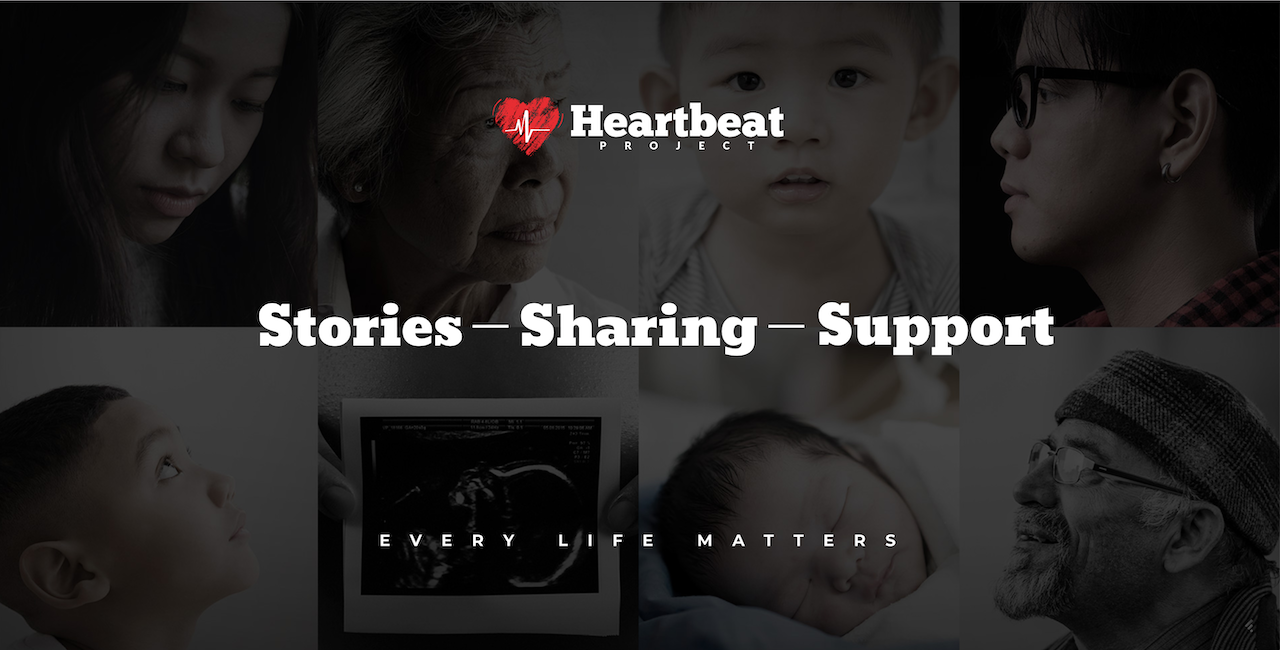What does it say about Singapore’s crisis of religion, that when a Christian-backed pro-life campaign emerges, our immediate response is to pick up our proverbial pitchforks and ready ourselves for war?
When I was first tasked to investigate the Heartbeat Project, it was framed as a platform for Christians to push their anti-abortion agenda. I could already hear the sharpening of knives.
Beneath it, though, was the high-pitched buzz of cognitive dissonance that rings in the ears of many Christians who, like myself, also identify as progressives.
Already, our collective faith in the church took a beating when battalions of believers dressed in white in a display of hostility towards the LGBTQ community and its annual Pink Dot event. The We.Wear.White movement told us we had to pick a side. You’re either for us or against us. Either wear pink or wear white.
The more liberal amongst us defected, leaving traces of our politics on social media, only to be drowned out by media coverage of Lawrence Khong’s battle cries.
Now we arrive at the Heartbeat Project, burdened with prejudice and vindictive hearts. Unlike the fight with the LGBTQ community, of which I am a firm supporter (though not a member of), this one feels painfully personal.
When I got pregnant as a teenager, I was sworn to secrecy. My then-boyfriend said that if his conservative Christian parents found out, they would reject us, throw him out of the house, and our lives (essentially, his life) would be ruined forever. My childish feelings were never part of the equation.
He was older than me, domineering and forceful, and I was meek and naive, and I didn’t want to be alone. He said to abort the baby, so I had the abortion. I never told my parents, or my church friends. Had I spoken to someone about how I dreamt of cradling a baby girl swaddled in a soft blue blanket, about my belief in the sanctity of all life, about my confidence in my ability to balance school and work and child, I might have chosen differently. I might not.
After all these years comes this Christian group dredging up skeletons from my closet. So primed was I to resist these anti-abortion right-wing activists, they’re finally giving me permission to speak.
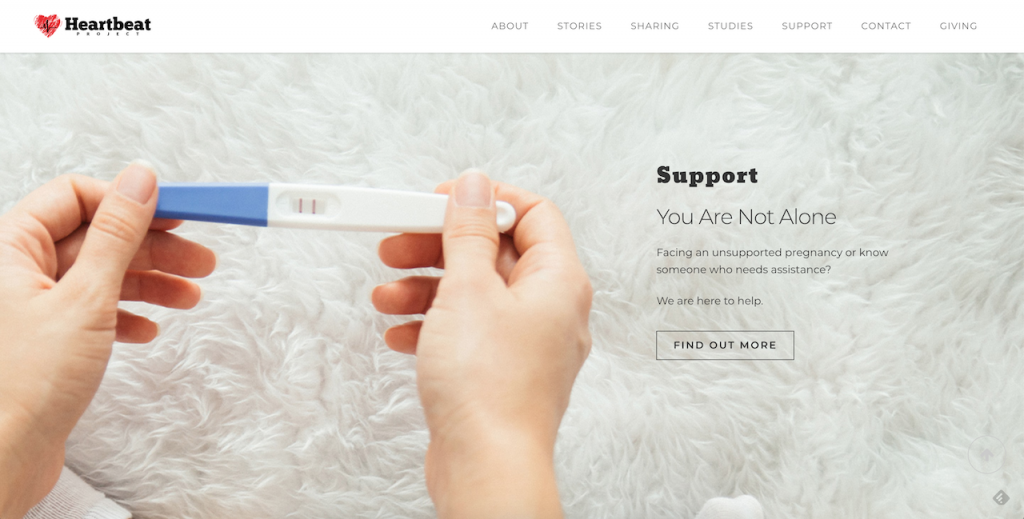
Here is a list of advocacy groups and causes that bear the tagline, “Every Life Matters”: a cat rescue programme; a suicide prevention platform; eldercare, medical missionary work.
And the Heartbeat Project.
Each one implores us to care more about the lives of their beneficiaries, from the cats and the old and infirm, to the women facing unplanned pregnancies and the potential for life that grows within them.
According to the latest Ministry of Health data, abortion rates in Singapore have fallen steadily from 11,933 in 2007 to 7,217 in 2016. And just 343 of those women were under the age of 20. Meaning that the stereotypical image of a teenager who had unprotected sex isn’t representative of the majority of women walking into the abortion clinic.
In fact, married women may terminate their pregnancies when in crisis.
Yet even these married women are painted as oversexed or irresponsible thanks to the stigma attached to abortion. Their individuality, along with our empathy, is diminished with this characterisation.
“Every Life Matters” reminds us that these women deserve dignity. To care for these women is to acknowledge that each of them is plunged into their personal hell when faced with the prospect of an abortion. Whether they’re poor or wealthy, married or not, each woman’s hell is tailored to their specific circumstances. As they struggle with complex dilemmas both moral and practical in constitution, equal in immensity, onlookers may not fully appreciate their plight.
The Heartbeat Project presents this tumultuous ordeal in the form of a short film called Letters of Grace. The video tells the story of one woman, two pregnancies under very different circumstances, and opposite outcomes.
It goes like this. Two decades ago, a young and unmarried Serene had an abortion. Many years later, now married, she finds out her unborn daughter Grace will have Spina Bifida, a congenital condition that could cause irreparable nerve damage. She has the baby anyway, and has no regrets.
“We have a choice,” reads the closing title card. “Let’s choose life.”
It is a high-quality production. The authentic script and piano soundtrack tug at your heartstrings, and powerful shots of interactions between Serene, her husband, and Grace have moved many to tears (evidenced by the hundreds of likes and comments on their Facebook page). But it’s the soundbites that do it for me.
“People have commented that we were selfish in choosing to keep you because it would take away our attention and finances,” says Grace’s father in a voiceover.
“But the truth is the total opposite. You have brought so much joy to everyone around. And you have inspired us to always see beyond our circumstances.”
The video invites us to contemplate the circumstances under which Serene and her husband must make their choice, and acknowledge that there are women like Serene with the will and resources to transcend them.
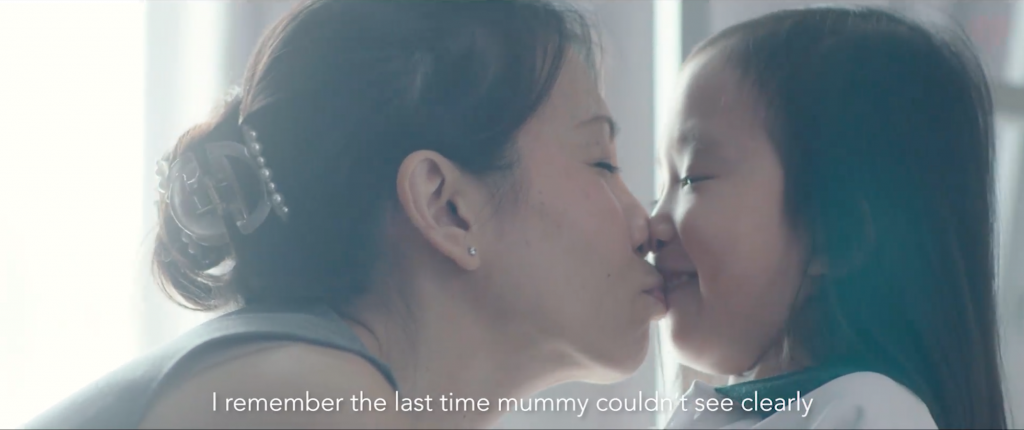
There is an image of Serene on The Heartbeat Project Facebook page that is captioned: “I believed I had no choice but to abort.”
While existentialism is not a guiding principle in Christianity, the implication here is that Serene did have a choice. And the campaign creators are not wrong. Abortion is always a choice, albeit an impossibly hard one to make.
However, what is also implied in the statement is that choosing to keep the baby is the better choice, when in truth this choice can have dire consequences. For example, if you give birth to a child when a genetic defect that is too costly for you and your extended family to manage, then it is likely that you and the child will suffer. While a Christian might say this is the right thing to do, a secular ethicist might deem this choice immoral.
Still, the philosophical basis for the campaign poster’s tagline, though probably unintended, is that the choice to give birth is ultimately still yours to make.
This becomes problematic when we consider that many women, particularly the young and vulnerable, feel like they do not have any say in the matter. They are held in a chokehold by the moral absolutism that swaddles the rest of society, which insists upon a single best choice whether that choice is to abort the baby (in a utilitarian calculus), or to keep the baby (in line with religious teaching).
Society insists with gleeful contempt on exacerbating the conflict between what you want and what is “best”. As Grace’s husband says in the film, others will make you feel selfish for your choice.
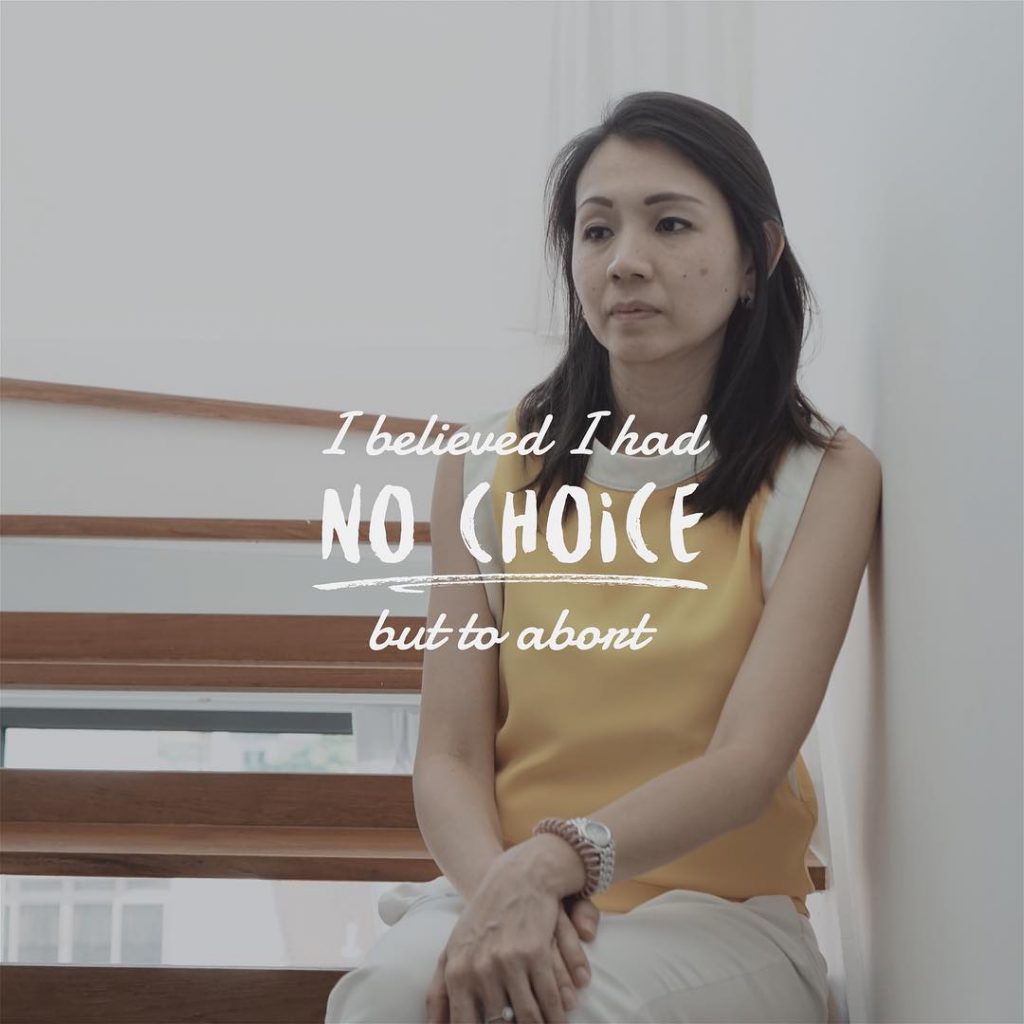
Unsurprisingly, each of us is terrified of one day being the one flogged. So we keep our controversies and misadventures to ourselves.
At this present moment, I wrestle with the choice to write myself into this discourse because it exposes my own moral deviance to people whose love and respect I am frantic to retain. But to keep quiet about my abortion would make me complicit in the shaming and disenfranchisement of women with unplanned pregnancies. And it would be a disservice to any woman who has felt that they were stripped of choice.
Just as a woman battling breast cancer needs to know what she’s getting into when she has a double mastectomy, a woman told that her baby is at risk of a genetic disease would need to understand the symptoms, potential complications and associated costs, financial, emotional or otherwise. Similarly, a young, unmarried woman can come to a rational decision on whether to keep her pregnancy if she has a realistic sense of how much her partner, family and friends are willing and able to support her whether through material or psychological means.
In my own experience, because I felt that I was coerced into silence, I couldn’t know if my family and friends would accept me for what my partner believed in their eyes would have been an unforgivable transgression. Even if I wanted to confide in someone who might understand, I didn’t know who to turn to. No one I knew was so immoral as to have sex at my age, right? (Ah, the innocence of youth.)
I was not presented with the full range of possibilities when making the choice, and I was too scared to find out, which really turned it into a non-decision.
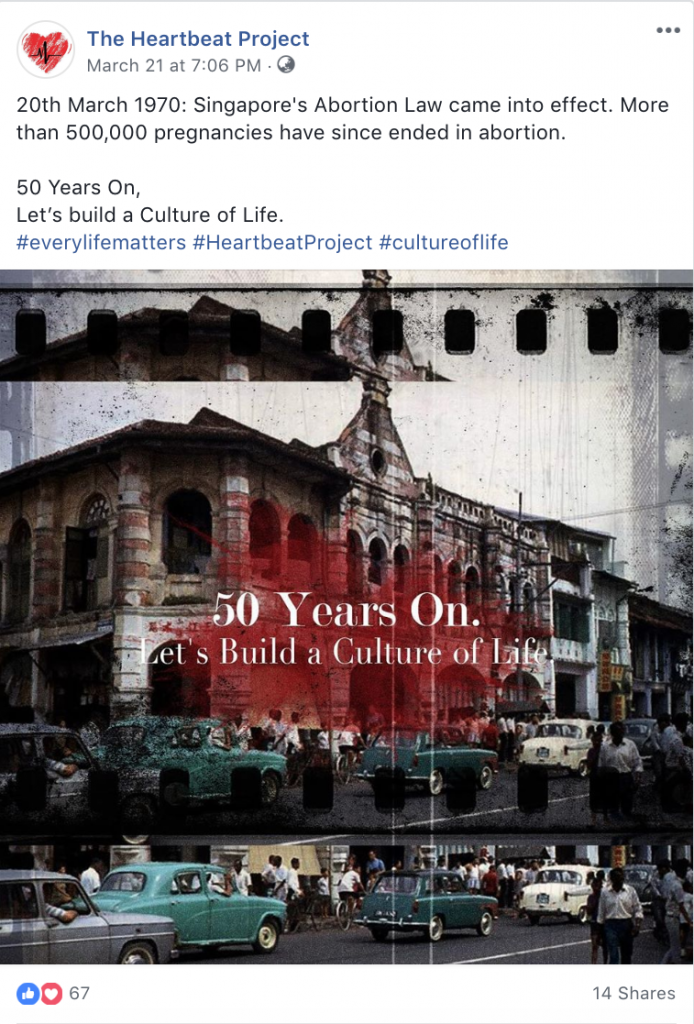
What does it say about the state of society that young women are afraid to speak to even the ones who care about them most when it comes to unplanned pregnancy?
The very real fear of social sanctions isn’t a product of Christian morality. It permeates every facet of Singaporean culture; an internalised shame that unites the Anglican and the agnostic, the ivory tower-dweller and the everyday heartlander. Religion is but one of multiple sources of sociocultural pressure that drive the fear deep into our subconscious, impairing our ability to make these personal decisions rationally and objectively.
Instead of finding a side to blame, we should ask ourselves why this is so. It’s not a matter of religious groups being too intolerant, or the rest of the world being too sinful. There’s centuries of conditioning to undo, and we all have a part in changing the conversation.
There are unexpected oases both on and offline that have burgeoned as safe zones to directly confront our deep-seated anxiety around sex and sexuality. For instance, some people choose the shroud of anonymity provided by Reddit to pour their hearts out, probably for the first time, about their pregnancies—“Im 19 and still studying with close to no finances hence don’t intend to keep the baby or tell anyone about this,” confesses one user.
“Got my friend pregnant. Need advice … She’s a month late and has been showing the symptoms for a week. We’re taking A Levels now so I don’t know if it’s the stress,” writes another.
Both posts receive an outpouring of, frankly, great advice. Some commenters tell them to seek counsel from an older loved one first, others share useful information about abortion clinics and procedures in Singapore.
What does it say about this so-called progressive nation that during a pivotal moment in their lives, these young people resort to a platform regularly used to discuss the latest trending meme or seasonal fast food item to find answers?
Until they seek help from these online portals, or pregnancy crisis organisations like Babes and Family Life Society, some women are not aware that the government’s Baby Bonus scheme, which includes cash gifts and co-savings programmes, is available to unwed mothers. And many don’t know how the adoption process works. If they hadn’t reached out, it is likely that many women from low-income backgrounds would have chosen to abort.
Not all will change their mind. Maybe they do come from a family that would disown them. And many young underprivileged women do. Babes says that while it cannot share statistics on the number of its service users who were forced out of their homes, approximately 45% stay in rental apartments.
Or maybe they simply aren’t ready, and the emotional distress of a child would be too much to bear. We need to respect all of those reasons, and in this country we do. At least, it is reflected in legislature that empowers women to carry out the medical procedure under safe and legal conditions.
At the same time, women have the power to decide only if they have the right education—on sexual health and fertility, and on the resources that are available to them should they fall pregnant. And for that, we need early intervention at schools and within the home. And if we must force society to have this important conversation, then it will have to be done through public policy.
One Christian campaign may have been enough to ignite an online war, but it isn’t enough to start a healthy conversation.
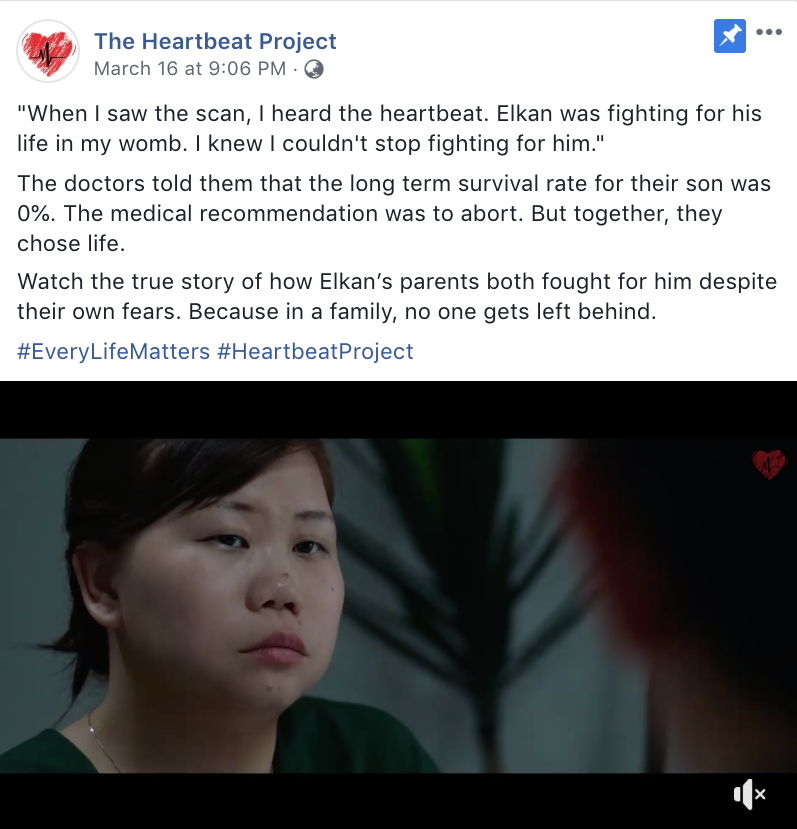
In the absence of national education, there will be many independent political and apolitical groups that try to sway your decision. The Heartbeat Project urges you to choose to have the baby. Does this mean the Heartbeat Project is pushing an anti-abortion agenda?
The answer is an emphatic no—in the sense that its creators have no intention to overturn the law that permits abortions in Singapore. If you argue that they are anti-abortion in the sense that they actively discourage abortions, I will counter that nobody is “for” abortions. Ask an atheist and they will probably tell you that no woman should have to go through the emotional trauma of an abortion. Because even if the actual procedure lasts five minutes, the impact that it has on a woman is painful and lasting.
This raises the question of whether the language we use in the debate on abortions needs to change. This isn’t an issue of pro-life versus pro-choice. Abortion is a multidimensional problem much too complex to split society down the middle with a vote for and against.
At the crucible of the war against faith-based campaigns like the Heartbeat Project is the Jekyll-and-Hyde characterisation of Christianity. The truelove.is movement comes to mind—an outreach programme targeted at the LGBTQ community within the church that is as alienating to some as it is compassionate to others. Unconditional love and forgiveness are its central tenets, yet when an issue like abortion that demands that degree of mercy and acceptance emerges in the wider culture, the church pulls up the drawbridge and seals its fort to protect their own from being morally corrupted by the outside world.
The creators of The Heartbeat Project claim to take aim at this punitive culture, as they explain on their website: “Through real-life stories and resources, we want to create conversations that will inspire the church to support those facing unplanned pregnancies.”
They say they want dialogue, not confrontation.
So it is ironic that I was treated like the enemy when I wrote to them in full disclosure that I am a journalist and a Christian at the start of my research for this story.
“As a Christian, I feel deeply morally conflicted because I understand that life is sacred, but I myself had terminated an unplanned pregnancy at a young age and it still haunts me.”
I had surprised myself by how confessional (and perhaps, unprofessional) my media request was. In the years that passed since my abortion, I convinced myself that I’d come to terms with it. But I found while penning the message that I still cannot bear the thought of my church friends or my parents learning about this (now very open) secret.
The Heartbeat Project administrators never did get back to me, even though sources from 3:16 Church, who are responsible for the campaign, confirmed that the message had been escalated to the senior pastor. The pastor said nothing. I felt let down by my own community.
Were they wrong to assume I was coming for blood? Maybe not (and if so, we all have a part to play in this state of affairs).
Prejudice hurts all of us. Pregnant women in crisis need the support of community and they don’t care which side of the aisle it comes from. Presumptuous claims about motivations behind the help do not benefit anyone, but financial aid or an emotional outlet to deal with the anxiety of childbirth and childcare can and do.
Consider Reddit a double-blind social experiment that proves we can come together as a community to support a fellow human in distress if we wanted to. There are no bloody gladiator battles or gruesome public executions; no spectacle, and no gawking; only faceless but earnest participation in a conversation about whether a pregnancy is worth keeping.
And, occasionally, also crispy chicken at McDonald’s.

